二战英文介绍
抗日战争英文作文故事

抗日战争英文作文故事英文回答:In the annals of human history, the Second Sino-Japanese War (1937-1945) stands as a poignant reminder of the horrors and sacrifices endured during times of great conflict. The conflict between China and Japan had been simmering for decades, fueled by Japan's imperialistic ambitions and China's desire for self-determination. The Marco Polo Bridge Incident on July 7, 1937, served as the catalyst for the outbreak of full-scale hostilities.Initially, Japan enjoyed significant military advantages, swiftly capturing major Chinese cities and inflicting heavy casualties. However, the Chinese people, driven by unwavering patriotism and resilience, refused to succumb to foreign domination. Led by Generalissimo Chiang Kai-shek, the Chinese army adopted a strategy of attrition, engaging in guerrilla warfare and protracted battles to wear down the Japanese forces.The war had a devastating impact on both nations. Millions of Chinese civilians perished due to massacres, starvation, and disease. Entire cities were reduced to rubble by Japanese bombings. Japan, too, suffered heavy losses, with hundreds of thousands of its soldiers killed or wounded.International condemnation of Japan's aggression mounted during the war. In December 1941, the attack on Pearl Harbor by Japan brought the United States into the conflict, and the war became part of the broader Pacific Theater of World War II. With the support of its allies, China fought valiantly, gradually turning the tide against Japan.Finally, on August 15, 1945, Japan announced its unconditional surrender following the atomic bombings of Hiroshima and Nagasaki. The war had ended, but the scars it left on both nations would take years to heal.In the aftermath of the war, China faced the dauntingtask of rebuilding its shattered economy and society. The Japanese government, confronted with the overwhelming evidence of war crimes committed by its forces, issued a formal apology and committed to making reparations to China. However, the legacy of the conflict continues to cast a shadow over relations between the two countries today.中文回答:抗日战争英文作文故事。
二战英文介绍
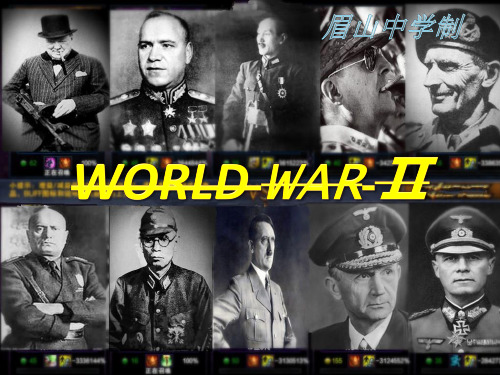
• It was a very important battle
• In the end 隆美尔 lost this fight so that germen could not control the Suez canal(苏伊士运河)or the oilfield in the Middle East
• Japan declared war on China in 1931. • On July 7th,1937, Japan began an all-out
attack on China.
Jiang’s speach at LuShan
我们知道全国应战以后之局势, 就只有牺牲到底,无丝毫侥幸 求免之理。如果战端一开,那 就是地无分南北,年无分老幼, 无论何人,皆有守土抗战之责, 皆应抱定牺牲一切之决心。
and suffering.
温斯顿·伦纳德·斯宾塞·丘吉尔
Air battle of Britain
• Germanys invasion of Britain could not succeed if the Luftwaffe did not have supremacy in the air. On 14th August 1940 the Luftwaffe launched an attack on British Bomber Command. In two weeks of air fighting, one quarter of British pilots were killed or badly injured.
Eastern to attack the Soviet union, he is not understand Napoleon's lesson. He just chose to ignore the facts.
描述二战的英语作文
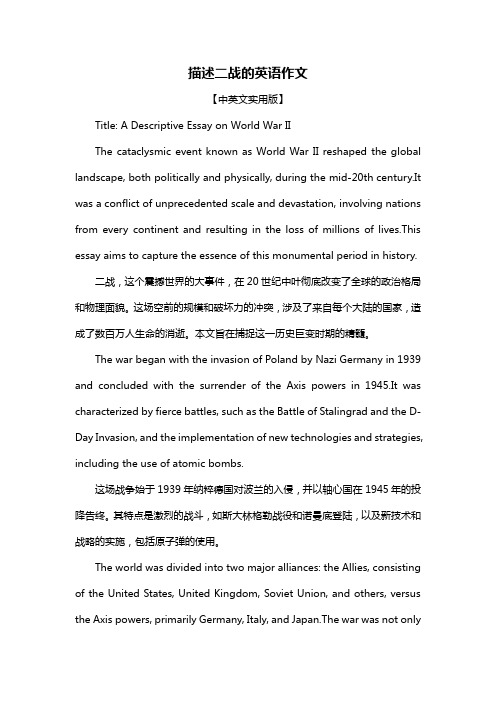
描述二战的英语作文【中英文实用版】Title: A Descriptive Essay on World War IIThe cataclysmic event known as World War II reshaped the global landscape, both politically and physically, during the mid-20th century.It was a conflict of unprecedented scale and devastation, involving nations from every continent and resulting in the loss of millions of lives.This essay aims to capture the essence of this monumental period in history.二战,这个震撼世界的大事件,在20世纪中叶彻底改变了全球的政治格局和物理面貌。
这场空前的规模和破坏力的冲突,涉及了来自每个大陆的国家,造成了数百万人生命的消逝。
本文旨在捕捉这一历史巨变时期的精髓。
The war began with the invasion of Poland by Nazi Germany in 1939 and concluded with the surrender of the Axis powers in 1945.It was characterized by fierce battles, such as the Battle of Stalingrad and the D-Day Invasion, and the implementation of new technologies and strategies, including the use of atomic bombs.这场战争始于1939年纳粹德国对波兰的入侵,并以轴心国在1945年的投降告终。
英文 二战广岛长崎原子弹事件
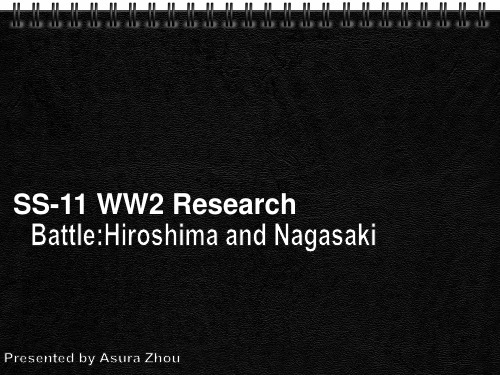
Page 2
Background 1945
In April 12, 1945, the white house. A painter in the painting portraits to President Roosevelt, the president suddenly coma , and died in the afternoon. In the evening, Vice President Harry Truman was sworn in as president of the United states. Just a minute. In the evening, the Secretary of the army told the new president, the one thing he never heard, a few years ago, President Roosevelt accepted the recommendation of the famous physicist Albert Einstein, decided to start a new weapon to develop a kind of unprecedented power. Planned to keep strictly confidential, except for few people, all the people engaged in this work did not know their research will be used where, did not know their products were used to do. This could completely reverse the entire war weapons within 4 months after it was developed, it was called an atomic bomb.
二战对世界的影响有多大英语作文

二战对世界的影响有多大英语作文英文回答:World War II had a profound and far-reaching impact on the world, shaping the course of history and leaving a lasting legacy. The war's consequences can be seen in various spheres, including geopolitics, economics, society, and human rights.Geopolitically, the war dramatically altered the world map. The victors, primarily the Allied powers, emerged as dominant global forces, while the defeated Axis powers, such as Germany and Japan, faced significant territorial losses and political transformations. The war also led to the emergence of new political ideologies, including the Cold War rivalry between the United States and the Soviet Union.Economically, the war stimulated industrial production and technological advancements, leading to the rise of newindustries and the creation of new employment opportunities. However, the war also caused widespread destruction of infrastructure, displacement of populations, and disruption of global trade, leaving a lasting impact on economies worldwide.Socially, the war transformed gender roles and family structures. With many men drafted into the military, women took on new responsibilities in factories, offices, and farms. The war also led to increased social mobility andthe expansion of educational and professional opportunities for marginalized groups. However, the war also broughtabout immense human suffering, including mass casualties, displacement, and the horrors of the Holocaust.In terms of human rights, the war raised awareness of the need for international cooperation to preventatrocities and protect fundamental freedoms. The Universal Declaration of Human Rights was adopted in the aftermath of the war as a response to the horrors committed during the conflict. The war also led to the establishment of the United Nations as an international organization designed topromote peace and security.中文回答:二战对世界的影响。
二战的危害英文作文初中
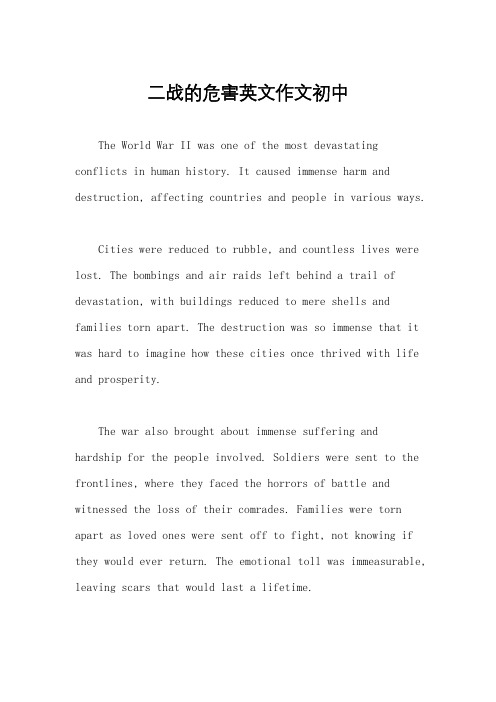
二战的危害英文作文初中The World War II was one of the most devastatingconflicts in human history. It caused immense harm and destruction, affecting countries and people in various ways.Cities were reduced to rubble, and countless lives were lost. The bombings and air raids left behind a trail of devastation, with buildings reduced to mere shells and families torn apart. The destruction was so immense that it was hard to imagine how these cities once thrived with life and prosperity.The war also brought about immense suffering and hardship for the people involved. Soldiers were sent to the frontlines, where they faced the horrors of battle and witnessed the loss of their comrades. Families were torn apart as loved ones were sent off to fight, not knowing if they would ever return. The emotional toll was immeasurable, leaving scars that would last a lifetime.The impact on the economy was also significant. Resources were redirected towards the war effort, leaving many countries in a state of scarcity. Rationing became a way of life, with people having to make do with limited supplies of food, clothing, and other necessities. The war disrupted trade and commerce, leading to economic instability and hardship for many.The war also had a profound impact on society and culture. The atrocities committed during this time left a lasting mark on humanity's conscience. The Holocaust, in particular, stands as a stark reminder of the depths of human cruelty. It forever changed the way we view and understand the nature of evil.Furthermore, the war brought about significant advancements in technology and science. The development of nuclear weapons and other destructive technologies forever changed the face of warfare. The world witnessed the devastating power of these weapons in the bombings of Hiroshima and Nagasaki, which left a lasting impact on global politics and security.In conclusion, the World War II brought immense harm and destruction. It devastated cities, caused suffering and hardship for individuals and families, disrupted economies, and left a profound impact on society and culture. It serves as a reminder of the devastating consequences of war and the importance of striving for peace and understanding.。
关于二战的英语小作文

关于二战的英语小作文英文回答:During World War II, many countries were involved in the conflict, including the United States, Germany, Japan, and the Soviet Union. The war lasted from 1939 to 1945 and had a profound impact on the world. The war was fought on multiple fronts, including in Europe, Asia, Africa, and the Pacific.One of the most significant events of World War II was the D-Day invasion, when Allied forces landed on the beaches of Normandy in France on June 6, 1944. This marked the beginning of the end for the Axis powers, as the Allies were able to gain a foothold in Europe and eventually push the Germans back.Another major event of the war was the bombing of Hiroshima and Nagasaki in Japan in August 1945. The dropping of atomic bombs on these cities by the UnitedStates led to the end of the war and the surrender of Japan.World War II also saw the rise of powerful leaders such as Adolf Hitler, Winston Churchill, Joseph Stalin, and Franklin D. Roosevelt. These leaders played key roles in shaping the outcome of the war.Overall, World War II was a devastating conflict that resulted in millions of deaths and widespread destruction. However, it also led to important changes in the world,such as the establishment of the United Nations and the beginning of the Cold War.中文回答:二战期间,许多国家参与了这场冲突,包括美国、德国、日本和苏联。
二战英语演讲稿
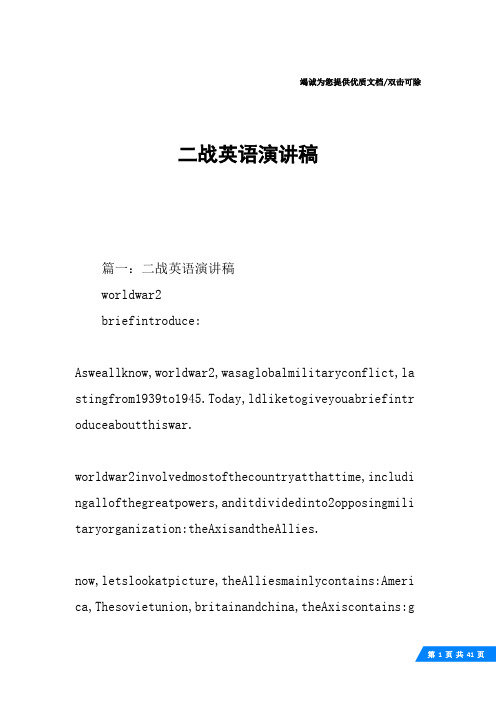
竭诚为您提供优质文档/双击可除二战英语演讲稿篇一:二战英语演讲稿worldwar2briefintroduce:Asweallknow,worldwar2,wasaglobalmilitaryconflict,la stingfrom1939to1945.Today,ldliketogiveyouabriefintr oduceaboutthiswar.worldwar2involvedmostofthecountryatthattime,includi ngallofthegreatpowers,anditdividedinto2opposingmili taryorganization:theAxisandtheAllies.now,letslookatpicture,theAlliesmainlycontains:Ameri ca,Thesovietunion,britainandchina,theAxiscontains:german,Italy,Japanandsoon.Then,letsknowabouttheleadersofmainlycountryduringth ewar.1.Adolfhitler:Thecorecharactersingermanyofworldwar2 .In1939,heagainstpolandwhichlaunchedthesecondworldw ar2.winstonchurchill:Inworldwar2heservedasprimeministeroftheunitedKingdo mfrom1940to1945andplayedaleadingrolewhoagainstgerma ndominationofeurope.3.stalin,Joseph:generalsecretaryofthecommunistpartyoftheunionofsovi etsocialistRepublics(ussR)from1922to1953,heisregard edasthedespoticruler.4.Roosevelt:,Althoughheisthedisabledperson,heisstillthegreatestl eaderofusAwhosparkedthefireofthewholecountrywithone heartnewspirit.note1:TheVersaillesTreatywasregardedasthefuseofthewar.not e2:nazi,thisnameisfullofattractive,butinfact,itisthesymbolofevil.Reason:Theoutbreakofwarhadlotsofcauses,butasfarasImconcern ed,themostimportantreasonsarethat.Inaword,duetothes eriouslyeconomiccrisis,theAxiswenttothewayoffascist .Theytriedtheirwholecountrypowerandresourcestodevel opthearmsandtoprepareforexpansion.Inthemeantime,TheAxiswerenotsatisfiedwiththeVersail lesTreatyandtheyallwantedtocontrolthewholeworld.whi le,unfortunately,theAlliesfacedtotheambitionsoftheA xisnegativelyandtheywerebusydevelopingtheeconomic.s o,afterthat,theworldwar2brokeout.process:Ineuro.breakoutInseptember,1939,germanylaunchedalighteningattackon polandwhichledbritainandFrancedeclaredwarongermany2 dayslater.Afterthat,germanycapturedFranceandsomeoth ersmallwesterneuropeancountries.Then,on1941.6.22,germanyopeningofthesecondfrontanda ttacktheussR.1.LeningradDefence:Inthenorth,thenorthernArmygroupsurroundedtheLeningr ad,itwasthesymbolofthecultureinthesoviet.Despitegre atsuffering,however,thepeopleofLeningradrefusedtosu rrender.whenfoodranout,peoplediedfromhungeranddisea se.Finally,theRedArmybrokethethree-yearsiegeofLenin gradonJanuary15,1944.Thiswaristhebloodiestbattlesin thehistoryofwarfare.2.Thebattleofmoscow:moscowisthecapitaloftheunionofsovietsocialistRepubl ics(ussR)anditisalsothelargestsovietcity.moscowwasr egardedasthepoliticalcenter,sostalinorderedthatallt heRedArmysoldiersshouldneverstepback.Thisbattlelast edforabout6month,andendedwiththevictoryofussRin1942 .01.07.3.Thebattleofstalingrad:bythesummerof1942.Inthesouth,thesouthernArmygrouppu shedeasttostalingrad,agreatindustrialcity,itwasthee conomiccentreofthesoviet.Thiswarwasamajorbattleofwo rldwarII.Duringthisbattle,thesovietgiventhegermanyA rmyaheavyblow.Afterwards,thegermancanneverleadedoff anattack.soitstheturningpointsofthewar.InAsian.Japanattackedtopearlharborin1941,12,7.ThenAmericajo inedthewar.Thebattleofsonghu:IntheAsianbattlefield.chinaplayedaveryimportantrole .shesufferedfromthemainattackofJapan,andshealsomade greatsacrificetoantifascist.class2Theturningpoints.石张磊7号normandylandings:In1944,thesecondeuropeanfrontwasop ened,britainandtheuslandedonthebeachesofnormandy.It meansgermanywilltrendtofailureinnearfuture.Finallybattles.AftertheAlliesoccupiedberlin,in1945,5,8.germanysurrendered.onAugust,1945,theusdropped2a tombombsonJapan,finally,Japanesesurrendered.Theworldwar2cametotheend.mythought:Inmyhumbleopinion,despitethenon,justtobehonest,thegermanyArmywasthemostpowerfulforc esinthattime.butAdolfhitlerhadmade3unforgivablemist akeswhichletgermanywenttofail.First,hedidnttryhisbesttobeatbritain,soheforcedtofi ghtontwofrontswhichletgermanyspentmoreresources.sec ond,hedidntovercametheLeninZiegler,sogermanyArmycou ldntsuccesstomeetwithFinland,thecountrywasattackedb ythesovietin1939,andthepowerfulnorthernArmygroupcou ldntgotosouthtosurroundthesovietArmy.Finally,themos timportantpointisthathitleradoptedapolicyofgenocide .Duetothatreason,manyenemywasforcedtodolifeanddeath struggle,thoughtheywerereluctantandhatetofight.Result:worldwar2letmorethan60millionpeoplelosetheirlivesan dgavepeopleendlesstrauma.but,intheotherside,manycou ntriesbecamesocialistordemocraticandmanycolonies(殖民地)wontheirindependence.ofcourse,inordertoavoidwarh appenagain,InApril1945,justattheendofthewar,theunit ednationsorganizationstartedinAmerica.Itisthemostim portantorganizationwhichiscommittedtomaintainingwor ldpeace.Tag:Ifyouareinterestedinworldwar2orevenhavesomedifferen tideas.Imverygladtocommunicatewithyouandtogiveyouso memoredetailsafterclass.Thankyouforlistening.篇二:关于战争英语演讲稿awordthatchangetheworldatthebottomofyourheart,cryou tfreedomabout4700yearsago,ourancestorhuangdicreatedanewnation,ineasternasia,fromtheqinunificationtotherevolutionledbysunya t-senin1911,ithasappearedatotalof83chinesedynasties。
英文 二战广岛长崎原子弹事件

Page 11
Finally...
In August 15, 1945, the emperor of Japan issued the surrender.
In September 2, 1945, in Tokyo Bay, "Missouri" on the deck of the battleship, the Japanese Foreign Minister Mamoru Shigemitsu and chief of staff Umezu Meijiro signed the surrender document. Signing time is four past nine. Then, the southwest Pacific theater commander Douglas Macarthur signature. USA, China, Britain and the Soviet Union and other countries at war with Japan accepted the Japanese surrender.
Page 4
Process
At eight o'clock on the morning of August 6, 1945, 3 B-29 from the sky into Hiroshima ocean. When a lot of people in Hiroshima did not enter the shelter, but lookded at the plane. Prior to this, B-29 has several consecutive days flied over Japanese airspace for training, but 3 aircrafts of this time, there was a aircraft which had been fitted with a 5-ton of atomic bomb. At this point it was ordered to bomb Hiroshima.
二战英文介绍【精品】
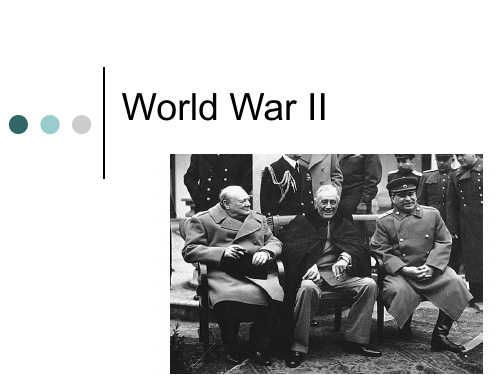
The British resistance convinced Hitler to postpone the invasion but he continued the bombing attacks.
A Grand Alliance
The Big Three
Great Britain (Winston Churchill) The U.S. (FDR) The Soviet Union (Joseph Stalin)
On June 22, 1941, Hitler launched Operation Barbarossa, consisting of an attack army of 4 million men spread out along a 2,000-mile front in three massive offensives. The German army quickly advanced, but at a terrifying cost. For the next three years, 90 percent of German deaths would happen on the eastern front.
After Pearl Harbor, American military leaders focused on halting the Japanese advance and mobilizing the whole nation for war.
The Battle of Britain
Hitler expected Britain to make peace, however, Britain, led by a new Prime Minister, Winston Churchill, refused to surrender. Hitler proceeded with invasion plans. The Luftwaffe began massive attacks on Britain to destroy its air defenses. Britain held firm during the Blitz despite devastating destruction to English cities.
二战的英语介绍简短

二战的英语介绍简短
简短介绍:
The Second World War, also known as WWII, was a global
war that lasted from 1939 to 1945. It involved the majority
of the world's nations, including all of the great powers,
and was the deadliest conflict in human history, causing an estimated 50 million to 85 million fatalities.
详细解释:
二战是指第二次世界大战,发生在20世纪30年代末至40年代中期。
这场战争覆盖全球,包括所有主要的大国,是人类历史上最为致
命的冲突,造成约5000万到8500万人死亡。
二战的爆发原因很复杂,其中包括国内政治不稳定、经济萧条、外交政策不当、极端主义、殖
民主义、种族主义以及领土争端等多种因素。
二战可分为两个主要阶段,即欧洲战场和太平洋战场。
欧洲战场
主要是指纳粹德国侵略欧洲和苏联,与英国、美国及苏联之间的战争。
太平洋战场主要是指日本进攻中国和其他亚洲国家,以及美国和其盟
友对日本的反击。
二战期间发生了许多重要的事件,例如纳粹德国的大屠杀、珍珠
港事件、诺曼底登陆、广岛和长崎的原子弹爆炸等。
战争结束后,出
现了一个全球性的新秩序,其中包括成立了联合国,德国和日本被迫放弃扩张政策,并开始了长达数十年的冷战时期。
美国二战历史英文作文

美国二战历史英文作文The United States and World War II: A Pivotal Moment in HistoryThe United States' involvement in World War II was a defining chapter in the nation's history, shaping its role on the global stage and forever impacting the lives of millions. From the attack on Pearl Harbor to the ultimate victory, the American people demonstrated unwavering resilience, courage, and determination in the face of unimaginable adversity.The road to America's entry into the war was a tumultuous one. Prior to the outbreak of hostilities in Europe, the United States had sought to maintain a stance of isolationism, wary of becoming entangled in the conflicts of the Old World. However, the rapid advancement of the Axis powers and the horrific atrocities being committed could not be ignored. As the war raged on, the United States gradually shifted its position, providing aid and support to the Allied forces through programs such as the Lend-Lease Act.The pivotal moment came on December 7, 1941, when the JapaneseEmpire launched a devastating attack on the American naval base at Pearl Harbor, Hawaii. This surprise assault, which claimed the lives of over 2,400 servicemen and civilians, shattered the nation's sense of security and propelled it into the war. President Franklin D. Roosevelt's impassioned address to Congress, in which he famously declared the date "a date which will live in infamy," galvanized the American people and led to a unanimous declaration of war against Japan.The American war effort was a massive undertaking, requiring the mobilization of the entire nation. Millions of men and women answered the call to arms, leaving their civilian lives behind to serve in the military. The industrial might of the United States was harnessed to produce the vast quantities of weapons, vehicles, and supplies needed to support the troops. Women played a crucial role in this effort, filling essential positions in factories and industries previously dominated by men.The battles fought by American forces were marked by heroism, sacrifice, and strategic brilliance. From the hard-fought campaigns in the Pacific theater, where the Marines battled the Japanese in brutal island-hopping campaigns, to the decisive victories in Europe, where the Allied forces liberated the continent from the grip of Nazi tyranny, the American soldier proved to be a formidable foe.The Battle of Normandy, also known as D-Day, stands as one of the most pivotal moments of the war. On June 6, 1944, the largest amphibious invasion in history was launched, as Allied forces stormed the beaches of Normandy, France. The courageous men who waded through the surf and scaled the cliffs in the face of withering enemy fire paved the way for the liberation of Europe.The war in Europe culminated in the defeat of Nazi Germany, marked by the surrender of the Axis powers in May 1945. However, the conflict in the Pacific continued, with the United States engaged in a brutal island-hopping campaign against the Japanese Empire. The decision to employ the atomic bombs on the cities of Hiroshima and Nagasaki, while controversial, ultimately led to Japan's surrender in August 1945, bringing an end to the deadliest conflict in human history.The impact of World War II on the United States cannot be overstated. The war transformed the nation, both socially and economically. The mobilization of the workforce, the advancements in technology and industry, and the increased role of the federal government all contributed to the emergence of the United States as a global superpower. The sacrifices made by the American people, both on the battlefield and on the home front, forged a sense of national unity and pride that continues to resonate to this day.Moreover, the war had a profound impact on the lives of individual Americans. Millions of veterans returned home, many bearing the physical and emotional scars of their experiences. The GI Bill, which provided educational and housing benefits, helped these men and women reintegrate into civilian life and paved the way for the prosperity of the postwar era.The legacy of World War II continues to shape the United States, both in its foreign policy and its domestic affairs. The lessons learned, the alliances forged, and the determination displayed during the conflict have all contributed to the nation's enduring strength and influence on the world stage. As we reflect on this pivotal moment in history, we are reminded of the extraordinary resilience and bravery of the American people, who rose to the occasion and played a crucial role in the triumph of freedom over tyranny.。
介绍二战的英文小说作文
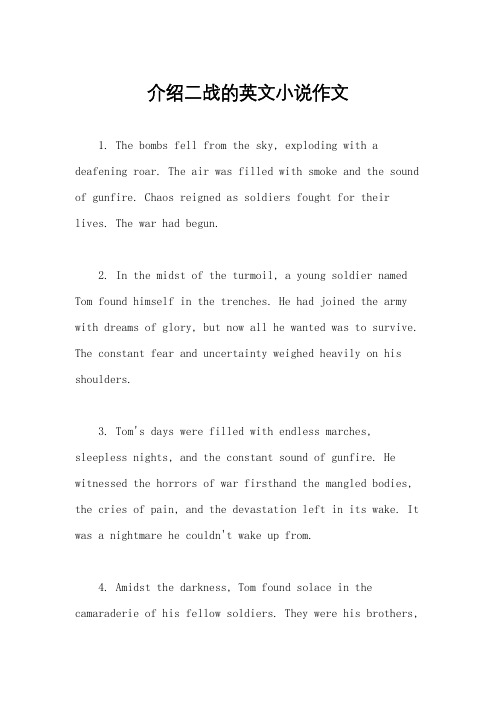
介绍二战的英文小说作文1. The bombs fell from the sky, exploding with a deafening roar. The air was filled with smoke and the sound of gunfire. Chaos reigned as soldiers fought for their lives. The war had begun.2. In the midst of the turmoil, a young soldier named Tom found himself in the trenches. He had joined the army with dreams of glory, but now all he wanted was to survive. The constant fear and uncertainty weighed heavily on his shoulders.3. Tom's days were filled with endless marches, sleepless nights, and the constant sound of gunfire. He witnessed the horrors of war firsthand the mangled bodies, the cries of pain, and the devastation left in its wake. It was a nightmare he couldn't wake up from.4. Amidst the darkness, Tom found solace in the camaraderie of his fellow soldiers. They were his brothers,his family. Together, they shared stories, laughter, and tears. They leaned on each other for support, knowing that they were all they had in this brutal war.5. As the war dragged on, Tom's hope began to fade. The once vibrant young man had become a shell of his former self. The constant violence and death had taken its toll on his spirit. He wondered if he would ever see his loved ones again.6. But amidst the despair, a glimmer of hope emerged. The Allies were making progress, pushing back the enemy forces. Tom felt a surge of determination, a renewed sense of purpose. He fought with everything he had, fueled by the belief that they could win this war.7. Finally, the day came when the war was over. Tom and his fellow soldiers celebrated, but the scars of the war would never truly heal. They had lost friends, witnessed unspeakable horrors, and experienced the darkest side of humanity. The war had changed them forever.8. As Tom returned home, he struggled to find his place in a world that had moved on without him. The memories of the war haunted his dreams, and he couldn't shake the feeling of survivor's guilt. But he knew he had to keep moving forward, for himself and for those who never made it back.9. The war may have ended, but its impact would be felt for generations to come. The sacrifices made by soldiers like Tom would never be forgotten. Their stories would be told and retold, a reminder of the price of freedom.10. And so, the war became a part of history. A chapter in a book, a lesson for future generations. But for those who lived through it, it would always be more than just words on a page. It would be a memory etched into their souls, a testament to the strength and resilience of the human spirit.。
二战英文简介

IntroductionOn 1st September 1939 Germany invaded Poland. They used a new type of warfare called …Blitzkrieg‟ or …Lightening War‟. This is a war when tanks and planes are used to knock out the defences so that the defending country is easier to conquer. Two days after this happened; Britain and France declared war on Germany and the other Axis powers. It wasn‟t until 7th December 1941, after a surprise attack by Japan, that destroyed most of America‟s navy whilst it was still at Pearl Harbour that America joined the war to help Britain and France. Also in the war was the Soviet Union under the control of Stalin. On 6th June 1944 the Allies Invaded France in a massive attack and by 2nd September 1945 the Allies had won the war.Turning PointsDunkirkThe rapid defeat of the Allies in France in 1940 came as a great shock to many people, not least the British Expeditionary Force. The Germans forced the British troops out of Belgium. Most of the troops fell back onto the beaches of Dunkirk between May 29th and June 4th 1940. The Royal Navy did not have enough ships to risk a lone rescue so they called upon the British public for help. Anyone who had a vessel capable of sailing across the channel was asked to come forward to help Britain in her …hour of need‟ The re was a massive response. The Makeshift navy was called the “Skylark Navy”. All together it took 7 days to complete the evacuation. Because the operation had to be done with such speed, guns and heavy fortifications had to be left behind. This cost lots of money but saved lives. Even though the defeat in France was a disaster, the event of saving the British troops boosted moral and made people believe that the operation was a great British success. The soldiers that had been rescued from Dunkirk were bitter towards the Nazis and this proved useful during the D-Day landings.Battle of BritainGermanys invasion of Britain could not succeed if the Luftwaffe did not have supremacy in the air. On 14th August 1940 the Luftwaffe launched an attack on British Bomber Command. In two weeks of air fighting, one quarter of British pilots were killed or badly injured. For 53 nights they came every night. On 7th September 1940 the Luftwaffe started bombing Cities. This was a fatal mistake. It gave the RAF time to regroup, repair airfields and train new pilots. This is probably what cost Germany the war. On 15th September 1940 the German air force came by daylight. Also, at this time there was a lot of propaganda going on to boost British citizens moral. People were asked to donate scrap metal for new planes. This metal would just have been dumped though, because metal was plentiful, pilots were not. On many radio broadcasts it was reported that more German planes were shot down than actually were. In some cases three or four times as many. The Britain won the Battle of Britain for a few reasons; the Allied planes, Spitfire and Hurricane easily outmatched the Luftwaffe‟s fighters. Also, the British pilots were highly trained and very efficient, they were ready to take of at a moments notice. At the height of the battle, they would be fighting practically all day. Just landing for fuel and ammunition.Battle of the AtlanticBecause Britain is an island, her supplies mainly brought in from abroad. This meant that Hitlercould cut off the supplies by bombing supply ships that were heading for British ports. Because Hitler had already gained control of most of the supply counties all he needed to do was to stop the Americans. He used a type of submarine called a U-boat. These were fairly heavily armed and could easily sink ships. To protect the ships from these, U-boats American ships would travel close together in convoys. American and British destroyers would surround these convoys, making it hard for U-boats to destroy and entire convoy and get home without damage. The battles were so frequent and hard to win that in 1941, 1299 allied ships were sunk (Six times as many as could be replaced). Only 87 German U-boats were sunk. To the Germans this was nothing. By July 1942 they were being launched at a rate of 30 per month. To cope with this new threat from U-boats, a new radar system was fitted to destroyers so that depth charges could be deployed in the correct area of sea. Radar systems were also fitted to planes so that they could seek-out and destroy U-boats whilst they were recharging their batteries. So that German U-boats could contact each other secretly, a new code was formed. This code was the Enigma code. Two Enigma machines were needed to encode and decode. This was very effective until one enigma machine and cipher documents were captured by the HMS Griffin, unharmed in May 1940. Thanks to this, the newly formed, ‟convoy‟ system of travel and the code-breakers of Bletchley park, the German U-boats were no longer as good a weapon as they were at the start of the warD-DayOn 6th June 6,500 vessels landed over 130,000 men on five Normandy beaches: Utah, Omaha, Gold, Juno and Sword. 12,000 aircraft ensured air superiority. They bombed German defences and provided cover. On Utah beach 23,000 troops were landed at a cost of 197 casualties. However, on Omaha beach the landing was significantly harder, meeting with fierce German resistance, there were 4,649 American casualties. Overall, however, the landings caught the Germans by surprise and they were unable to counter-attack with the necessary speed and strength. Once the allied troops had destroyed the German defences they were free to bring new troops, machines and supplies over the channel and into Normandy. By the end of June, Eisenhower had 850,000 men and 150,000 vehicles ashore in Normandy. Fuel would have been a major problem for the allies, but thanks to the idea of piping oil straight from America, a pipeline had been built under the Atlantic Ocean. This was hard to destroy and so it was a success.In the weeks following the landings however, the narrow lanes and thick hedgerows of the French countryside slowed Allied progress considerably. Never the less in August Paris was liberated.EvacuationDue to the threat of war in 1939, women, children and old people were moved out of high-risk areas of Britain such as industrial areas and areas with a high population. In 1939 approximately 1,125,000 people were evacuated. This was a precaution and was not necessary. No direct action was taken against Britain by Germany. Most of the evacuees were transported back to their homes. However in August 1940, the war took a turn for the worse. The number evacuees rose to about 1,300,000. Life for evacuees was difficult. Most lived with people who didn‟t understand them. Some got to live with rich people and had a nice few years but most didn‟t. They were separated from their parents, not knowing if they were dead or alive. Many Mothers, children had diseases such as Vermin or Scabies, (see source). The evacuees where chosen by families, like at an auction.Each evacuee had a label saying where they were from and what medical conditions they had. This was horrible for most and “I'll take that one” became etched on the memory of our e vacuees.。
演示文稿二战英文课件
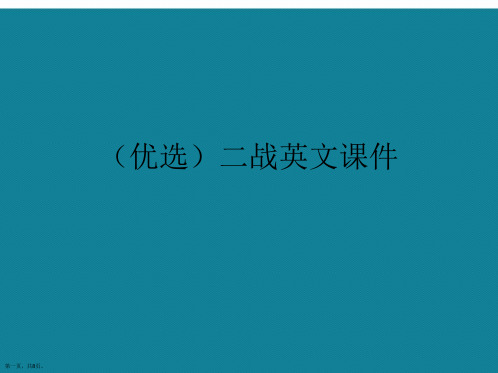
Belligerents and Representatives
Germany Adolf Hitler
Italy
Benito Mussolini
贝尼托·墨索里尼
Japan
第三页,共8页。
Hirohito 裕仁天皇
America
Britain
China
Franklin Roosevelt
第六页,共8页。
Course of the war
The start of the war is generally held to be 1 September 1939, beginning with the German invasion of Poland; Britain and France declared war on Germany two days later. Other dates for the beginning of war include the Japanese invasion of Manchuria on 13 September 1931; the start of the Secoቤተ መጻሕፍቲ ባይዱd Sino-Japanese War on 7 July 1937.
Intensification of the all kinds of conflicts:
England and France's appeasement policy ,certainly, contributed to Hitler's arrogance. Those pre-war events can prove completely, Japanese invasion of China, Japanese invasion of the Soviet Union and Mongolia, European.
我们可以从二战中学到什么英语作文
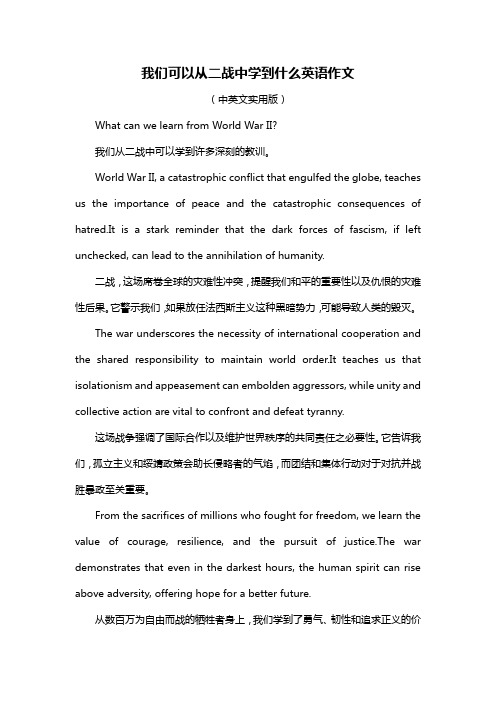
我们可以从二战中学到什么英语作文(中英文实用版)What can we learn from World War II?我们从二战中可以学到许多深刻的教训。
World War II, a catastrophic conflict that engulfed the globe, teaches us the importance of peace and the catastrophic consequences of hatred.It is a stark reminder that the dark forces of fascism, if left unchecked, can lead to the annihilation of humanity.二战,这场席卷全球的灾难性冲突,提醒我们和平的重要性以及仇恨的灾难性后果。
它警示我们,如果放任法西斯主义这种黑暗势力,可能导致人类的毁灭。
The war underscores the necessity of international cooperation and the shared responsibility to maintain world order.It teaches us that isolationism and appeasement can embolden aggressors, while unity and collective action are vital to confront and defeat tyranny.这场战争强调了国际合作以及维护世界秩序的共同责任之必要性。
它告诉我们,孤立主义和绥靖政策会助长侵略者的气焰,而团结和集体行动对于对抗并战胜暴政至关重要。
From the sacrifices of millions who fought for freedom, we learn the value of courage, resilience, and the pursuit of justice.The war demonstrates that even in the darkest hours, the human spirit can rise above adversity, offering hope for a better future.从数百万为自由而战的牺牲者身上,我们学到了勇气、韧性和追求正义的价值。
关于二战的读后观点,英文版
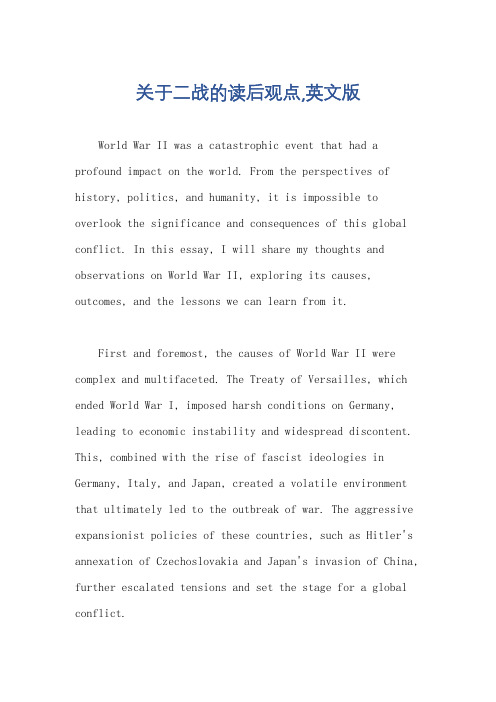
关于二战的读后观点,英文版World War II was a catastrophic event that had a profound impact on the world. From the perspectives of history, politics, and humanity, it is impossible to overlook the significance and consequences of this global conflict. In this essay, I will share my thoughts and observations on World War II, exploring its causes, outcomes, and the lessons we can learn from it.First and foremost, the causes of World War II were complex and multifaceted. The Treaty of Versailles, which ended World War I, imposed harsh conditions on Germany, leading to economic instability and widespread discontent. This, combined with the rise of fascist ideologies in Germany, Italy, and Japan, created a volatile environment that ultimately led to the outbreak of war. The aggressive expansionist policies of these countries, such as Hitler's annexation of Czechoslovakia and Japan's invasion of China, further escalated tensions and set the stage for a global conflict.The outcomes of World War II were far-reaching and transformative. The most obvious outcome was the defeat of the Axis powers and the establishment of the United Nations, a global organization dedicated to maintaining peace and preventing future conflicts. Additionally, the war led to significant geopolitical changes, such as the division of Germany and the emergence of the United States and the Soviet Union as superpowers. The Holocaust, a horrific genocide perpetrated by the Nazis, also came to lightduring this time, leading to a renewed commitment to human rights and the prosecution of war crimes.From a humanitarian perspective, World War II was atime of immense suffering and loss. The war resulted in the deaths of millions of people, both military personnel and civilians. The bombings of Hiroshima and Nagasaki, which marked the first and only use of nuclear weapons in warfare, caused unimaginable destruction and loss of life. The war also saw the displacement of millions of people, asrefugees fled their homes and sought safety elsewhere. The stories of individual bravery, sacrifice, and resiliencethat emerged from this dark period in history are a testament to the strength of the human spirit.Looking back on World War II, it is crucial to recognize the lessons it teaches us. Firstly, it serves as a stark reminder of the devastating consequences of nationalism, militarism, and intolerance. The war demonstrated the dangers of unchecked aggression and the importance of diplomacy and international cooperation in resolving conflicts. It also highlights the need for vigilance in defending human rights and combating ideologies that promote hate and discrimination.In conclusion, World War II was a defining moment in history, with far-reaching consequences that continue to shape our world today. From its complex causes to its devastating outcomes, the war serves as a reminder of the fragility of peace and the importance of learning from the past. As we reflect on this dark chapter in human history, it is our responsibility to strive for a future free from the horrors of war and to work towards a more just and peaceful world.。
苏联二战介绍英文作文
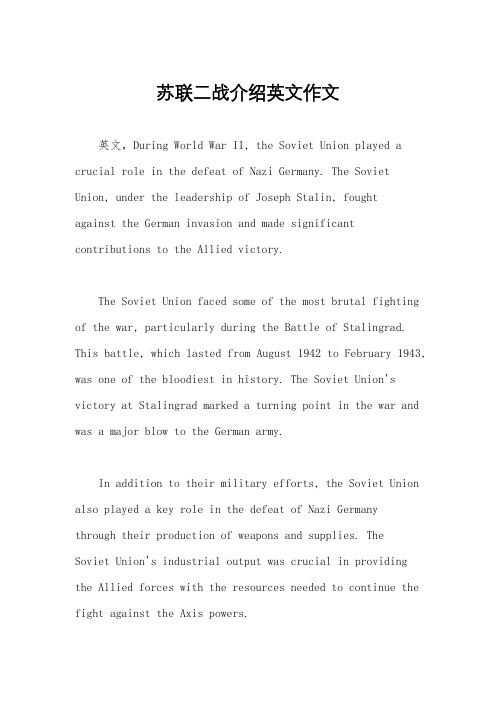
苏联二战介绍英文作文英文,During World War II, the Soviet Union played a crucial role in the defeat of Nazi Germany. The Soviet Union, under the leadership of Joseph Stalin, foughtagainst the German invasion and made significant contributions to the Allied victory.The Soviet Union faced some of the most brutal fighting of the war, particularly during the Battle of Stalingrad. This battle, which lasted from August 1942 to February 1943, was one of the bloodiest in history. The Soviet Union's victory at Stalingrad marked a turning point in the war and was a major blow to the German army.In addition to their military efforts, the Soviet Union also played a key role in the defeat of Nazi Germanythrough their production of weapons and supplies. TheSoviet Union's industrial output was crucial in providing the Allied forces with the resources needed to continue the fight against the Axis powers.Furthermore, the Soviet Union's participation in the war led to significant territorial gains. The Soviet Union not only defended its own territory but also liberated Eastern Europe from Nazi occupation. This had a lasting impact on the post-war world and contributed to the emergence of the Soviet Union as a global superpower.Overall, the Soviet Union's contributions to the Allied victory in World War II cannot be overstated. Their sacrifices and efforts were instrumental in the defeat of Nazi Germany and the ultimate triumph of the Allied forces.中文,在二战期间,苏联在击败纳粹德国方面发挥了至关重要的作用。
日本与二战 英文
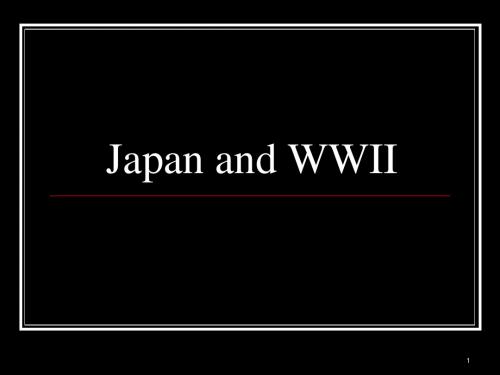
Control?
At
some believed that Japan was there to liberate. Japan was simply another dictator. Killed millions and destroyed cities.
7
st 1
Moபைடு நூலகம்ing South
Japanese
troops continued to move south into Indonesia.
8
9
British attempt to stop Japan
In
an attempt to stop the Japanese, the British send naval ships. Japanese use their planes to destroy the ships.
13
Attack
The
attack took 1 hour and 1 minute. 4 battleships were sunk 188 planes were lost because the U.S. didn’t expect an air strike
14
15
16
17
19
5
Control?
1938:
Japan sends 1 million troops to China. However, due to the size of China they had to send another million troops which still only allowed them to hold the major cities.
- 1、下载文档前请自行甄别文档内容的完整性,平台不提供额外的编辑、内容补充、找答案等附加服务。
- 2、"仅部分预览"的文档,不可在线预览部分如存在完整性等问题,可反馈申请退款(可完整预览的文档不适用该条件!)。
- 3、如文档侵犯您的权益,请联系客服反馈,我们会尽快为您处理(人工客服工作时间:9:00-18:30)。
IMMEDIATE CAUSE
• Poland is located in the eastern part of Europe, on the east of Russia, on the west of Germany, on the north of Czechoslovakia(捷克斯洛伐克). And its northern boundary is near the Baltic Sea. Because of its special geographical position, Poland becomes the transportation hub of Europe, which owns a strategic importance. Poland was one of the most powerful military forces among the European allies. If Germany occupied Poland, Germany not only had access to a large number of military and economic resources, but also greatly improved its strategic position: it not only could eliminate the worries of the British and French attack, but also to establish a base for attacks on the Soviet Union.
Monument to the "September Veterans" of 1939 in southern Poland.
The Bomb Attack of Hiroshima
The Atomic Bombings of Hiroshima
On August 6, 1945, the United States used a massive, atomic weapon against Hiroshima, Japan, killing tens of thousands of civilians. It is the first time to use weapons of mass destruction in the human history
process
1939.9.1 The invasion of Poland
1945.8.6 The United States dropped atomic bomb on Hiroshima (广岛)
WORLD WAR
Invasion of Poland
BACKGROUND
• After World War I, defeated Germany was forced to cede large tracts of land. Danzig(担泽), which belonged to Germany, was designated a free market and transferred to Poland. “Polish Corridor” leading to the Baltic Sea(波 罗的海) divided Germany into two pieces. So the
Japan lacks of strategic goods( petrol ) which hold back their economic development
Root cause: The Great Depression 大萧条
The Great Depression in 1929 resulted in serious political crisis. What was worse, in order to protect domestic economy, some nations such as America started to erect trade barriers ,which had a impact on Germany and Japan. While these countries couldn‘t get over the crisis by themselves, then they built the fascist dictatorship(法西斯专政) to do external expansion crazily
United 418,500
0.32
States
Japan 2,620,000 to (3.67 to 4.37) 3,120,000
Total 62,171,400 deaths 至
78,511,500
(3.17 至 4.00)
The Second World War
• Brief Introduction Of World War Two
Reasons
Germany would not take their defeat accepting the harsh punishment and limitless of the Treaty ofVe源自sailles(《凡尔赛条约》).
Direct reasons Italy falls into economic decline
Two opposing military alliances :the Allies and the Axis
Germany Adolf Hitler
Italy Benito Mussolini
本尼托 墨索里尼
Japan
Hirohito 裕仁
America Franklin Roosevelt Britain Winston Churchill
World War Two
By Qiu Shuang
Human losses of World War II
Country Total deaths Deaths as % of 1939
population
China 10,000,000 (1.93 to 3.86) to 20,000,000
the photo of Hiroshima after bombing
Such fragile the life is , please cherish peace
• Reasons • Process
Brief Introduction Of World War Two
Time: 1st September 1939------15th August 1945
The character(性质)of the War :It can be divided into two phases-imperialist war(帝国主义战争) and anti-Fascism war(反法西斯战争)
China
Jiang Jieshi
Soviet Union Stalin
Reasons
• The Aftermath of WWI • World War I caused the deaths of millions
and the destruction of numerous cities and farms. The European economy was in ruins.
Why chose Hiroshima?
• Hiroshima was described as “an important army depot and port of embarkation in the middle of an urban industrial area”.
• obtaining the greatest psychological effect against Japan
